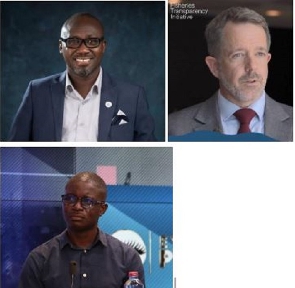 Professor Dennis Aheto (left), Sven Biermann (middle) and Nelson Atanga Ayamdoo (right)
Professor Dennis Aheto (left), Sven Biermann (middle) and Nelson Atanga Ayamdoo (right)
Despite some vibrancy having been injected into Ghana’s Fisheries sector in recent years, the sector is still believed to lack the adequate level of transparency desired to lead the country on a path of social, environmental, and economic prosperity and sustainability.
A new report launched last week shows that Ghana’s Fisheries governance setup has not been proactive in putting out updated, accurate, and easily accessible information online for public consumption.
The latest Taking Stock Transparency Assessment was conducted by the Fisheries Transparency Initiative (FiTI) in collaboration with the Centre for Maritime Law and Security (CEMLAWS) Africa.
Stakeholders gathered at the launch all acknowledged the need to do better, with the Deputy Minister for Fisheries and Aquaculture Development, Moses Anim highlighting that it is a “Wake Up Call for Ghana to join the Fisheries Transparency Initiative”.
Indeed, the Fisheries Transparency Initiative is an international multi-stakeholder effort that provides a unique global framework to help coastal countries to increase the credibility and quality of national fisheries information towards the sustainability of marine fisheries.
If Ghana joins the FiTI, commitment must come from the highest level of government, that is the President or the sector Minister in signing up as a FiTI Candidate country. To be considered a FiTI-compliant country, Ghana must adhere to the FiTI standard, which prescribes a comprehensive and credible way to achieve and maintain high levels of transparency on the management of the marine fisheries sector and the activities of fishers and fishing companies.
Touching extensively on the subject of the Eye on Port program, the Executive Director of the Fisheries Transparency Initiative, Sven Biermann, said it is absolutely necessary for information on the sector in Ghana to be publicly accessible online, given that the country’s online use is above the global average.
“If you look at the global average, 60% of people access the internet on a regular basis, in Ghana it is 69%. Almost 7 out of 10 people in Ghana access the internet so it is the way to go to provide information to the people of Ghana,” he said.
According to the Fisheries Transparency Initiative, many governments are not disclosing even basic information on their fisheries sector, such as laws, permits, fish agreements, stock assessments, financial contributions, catch data, and subsidies. Also, not all companies are reliably reporting on catch volumes, fishing practices, and payments to governments.
Furthermore, the data that is already publicly available is often incomplete, outdated, unverified, or not readily accessible, affecting the capacity of governments to manage their marine fisheries efficiently and sustainably, as well as the ability for effective oversight and accountability.
The Executive Director of FiTI said, during his stay in Ghana, he was asked his opinion on the close season policy strategy adopted in Ghana.
He said, “It is certainly not our job to say whether certain management aspects are working in a particular country. But even if I wanted to, I could not answer this question. Because the government has reports that look at how successful the close season was on the biodiversity of the targeted fish species, how it helps to recover the fish stock, and the socio-economic impacts but that report is not publicly accessible so even if you wanted to understand whether the government is heading in the right direction you cannot.”
Sven Biermann also urged the Fisheries Commission and its mother ministry for Fisheries and Aquaculture Development to reconcile data, and publish on a singular online platform during the dissemination of public information in order the avoid the overlaps and discrepancies that exist.
Adding on to that, the Director at the Center for Coastal Management (CCM), Professor Dennis Aheto called for more work to be done in the collection of fisheries data.
He said Ghana has relied heavily on collecting fisheries-dependent data but more efforts should also be put into collecting fisheries-independent data.
“Fisheries-dependent data focuses heavily on effort and catch but the need to collect other aquatic and environmental parameters to get environmental data on the fish stock population, abundance is to a large extent not collected. We will need the fisheries-independent data to be able to validate whatever data we are already getting from the fisheries-dependent data so we can make the right decisions for our sector. Unfortunately, this is not happening,” Prof. Aheto lamented.
The seasoned academic said the Food and Agriculture Organization of the United Nations (FAO) code of conduct outlines how data collection procedures must be done and curated for decisions, yet Ghana is unable to do this.
He said data collection gaps add up to the plethora of challenges bedeviling the sector in Ghana.
Also speaking on Eye on Port, the Team Lead in charge of training and partnerships at the Center for Maritime Law and Security, Nelson Atanga Ayamdoo revealed that, following the report launch, government representatives have demonstrated some commitment to work with CEMLAWS and FiTI to undertake the recommendations that were presented to them.
He said that because of the importance of fisheries to the country's long-term development, his organization has made it a priority to help identify and address any shortcomings in Ghana's fisheries governance and management.